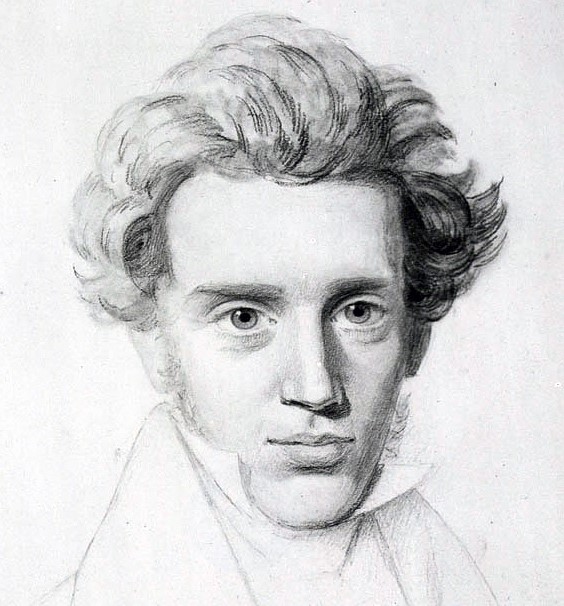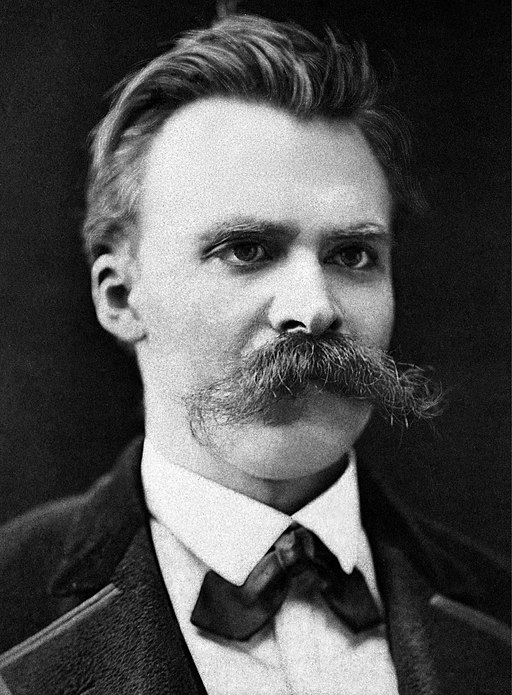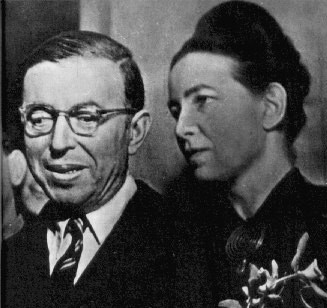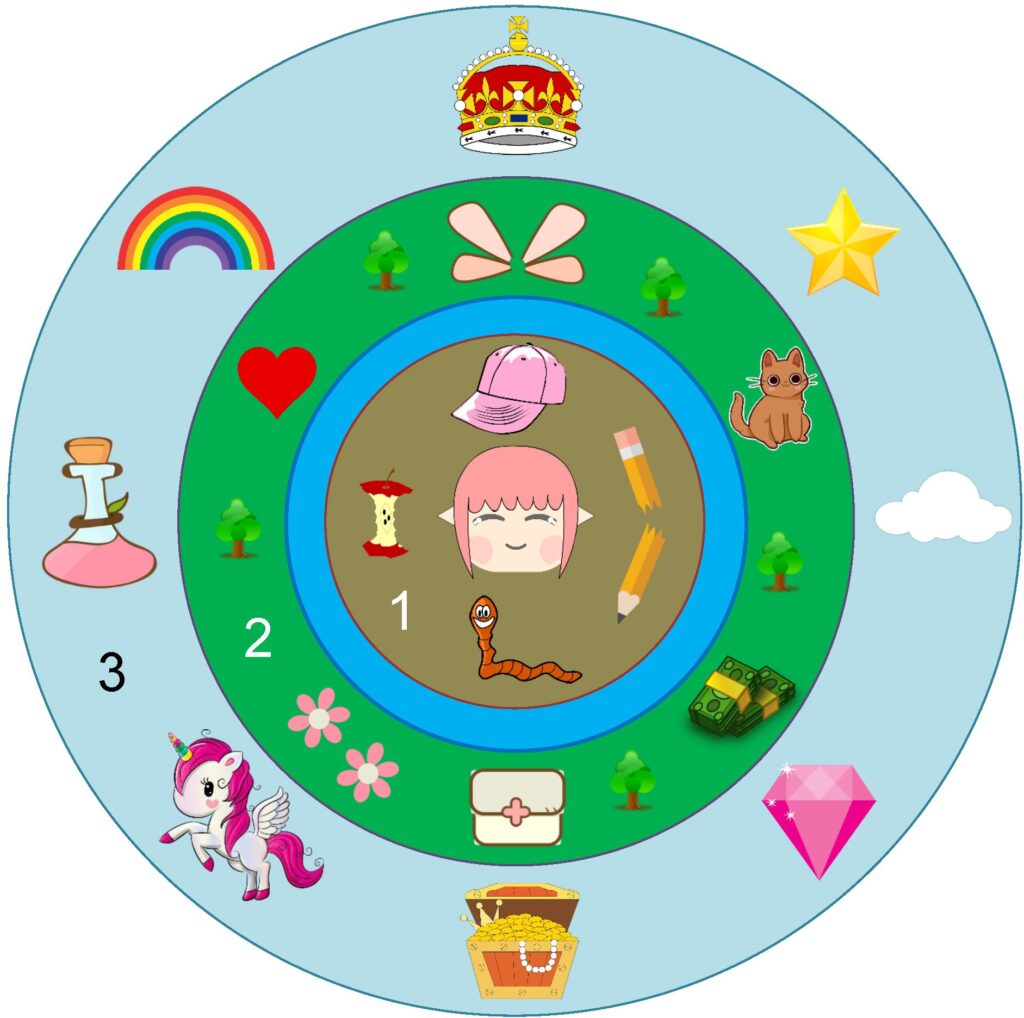Published May 5 / 6, 2021, for Kierkegaard’s & Freud’s birthdays 1
AWESOME

- Overview and Origins
- “Existence Precedes Essence” or “Rock, Paper, Scissors”
- “The Meaning of Life” is a Trick Question
- Freedom of Choice, Burden of Responsibility
- What Existentialism Essentially Isn’t
- Absurdity, Anxiety, Authenticity, Awareness, Actualization
- The Three Zones
- Conclusions
- Citations
1. Overview and Origins
“That’s so existential” … “I’m having an existential crisis” … . We hear this word all the time, but what does it actually mean?! “Existential” is notorious as a word whose definition is better suited to an encyclopedia article than to a dictionary sentence. That’s because it emerged nebulously from two centuries’ worth of loosely affiliated philosophical thought. The great existentialists disagreed with each other on many points, too. This essay can only claim to be my version of existentialism.
But to meet the challenge, let me propose my dictionary definition. The root of the word is existence. Existentialism deals specifically with human social existence. Science teaches us a multitude of things that we humans have in common with animals, vegetables, and minerals. Yet there is still something completely distinctive about being human, and that is where existentialists like Heidegger centered their philosophy. 2 I construe broad and narrow senses of the word. 3
Existentialism (broad sense; noun form): The study of how people exist and co-exist socially, such as how we perceive, create, and fit into existence.
Existential (narrow sense; adjective form): Self-actualized about the control that one has over one’s own life, including one’s nature, options and choices, freedoms, and responsibilities.
The movement that we now call existentialism emerged in response to the rapidly changing nature of science, psychology, and religion in the 1800s. Are humans bound by God’s plan? Are we programmed by clockwork laws of nature, or do we make our own way? Do we need religion to deal with life’s inevitable challenges and terrible moments? Existentialism is not necessarily atheistic, but it is an appropriate vehicle for meaning, purpose, and happiness independently of religious beliefs. This is immensely important at this juncture in history. You may believe strongly, as I do, that God is dead. However, few will follow us down that path if they equate “God” with “Good”. What alternative hope can we offer?
The history of existentialism is studded with colorful characters. The most influential are often listed as Kierkegaard, Nietzsche, and the power couple Sartre & de Beauvoir. I find it helpful to introduce existentialism with a quote from each of these philosophers. 2
Søren Kierkegaard (19th century, Danish)

What I really need is to get clear about what I must do, not what I must know …
What matters is to find a purpose,
To see what it is that God really wills that I shall do …
to find a truth which is truth to me, to find the idea for which I am willing to live and die. 4
Friedrich Nietzsche (19th century, German)
“This is my way; where is yours?” –
Thus I answered those who asked me “the way.”
For the way – that does not exist. 5

Jean-Paul Sartre & Simone de Beauvoir (20th century, French)
2. “Existence Precedes Essence” or “Rock, Paper, Scissors”
When Sartre made his famous “existence precedes essence” statement, he was placing humans in a third category between objects of nature and human-made gadgets. His example of a human-made object was a “paper-knife”, a form of scissors. We might also use words like form and function to describe such objects. Why do scissors exist at all? First, someone recognized a functional need: “I need something to cleanly cut this paper.” That inventor then designed scissors with a form to serve their function. The paper-knife’s essence preceded its existence.
Natural things, like rocks, are different. A rock has no reason for being; it simply exists. If it has an essence, it’s only something that we create in our minds afterward. We might decide, “I will throw this rock to scare away the birds” or “I’ll hide behind this rock.” But the rock was not put there for such a reason, or any reason. The same is true for all of nature, from the atoms in your body to planet Earth. They are not good, bad, or purposeful. They just exist. 8
What about people? We are not like scissors. We are not formed to serve pre-determined functions. When we are born, we “just exist.” However, we are also not like rocks. Everyone comes to assume an “essence” or role in society. This essence is created by each person herself, and those around her, in her own lifetime. Thus, her existence precedes her essence. This may sound simple or even obvious in retrospect, but this point of view is a radical departure from traditional religious ideas about human identity. We prefer to believe that we are all preconceived instruments, like scissors in God’s stationery drawer.
Sartre also observed that a person’s essence can only be revealed by his existence, i.e., his past words and actions. Sartre wrote a brilliant play, No Exit, about three self-delusional characters. Each one believed that he or she had a “true essence” hidden inside, which didn’t seem to match their actual accomplishments. The newspaper journalist insisted that he was brave. When the other characters reminded him of his cowardly actions, he had an excuse ready for each one. Without an act of heroism, it’s hard to justify an “inner hero”.

3. “The Meaning of Life” is a Trick Question
It’s interesting to compare the Kierkegaard and Nietzsche quotes above for their similarities and differences. Religious folks, Kierkegaard is the existentialist for you. He was devoutly Christian. Kierkegaard was reacting against science 9 as Nietzsche and Sartre later rebelled against religion, but they all arrived at the importance of self-determination.
When Kierkegaard looked for “a truth which is truth to me,” he meant “truth” in a sense that really means “importance”. If we’re studying most anything else – animal, vegetable, or mineral – there are universal truths and we’re not free to choose our own. But human goals, priorities, and outlooks are self-made. In 19th century Europe, science and religion both played up the importance of “knowing the right things”. Kierkegaard found knowledge useless without purpose. He was interested in individualizing knowledge, value, and behavior.
Individualism is also a word that would apply to Nietzsche. If you asked him, “What is the meaning of life?” he’d probably answer, “That’s a trick question!” Every religious faith believes that it has a monopoly on virtue, truth, and happiness. Each one pitches “the plan”, something like:
“There’s only one true path to enlightenment.”
“I am the way and the truth and the life.”
If only everyone followed this plan, they believe, we would finally have paradise on Earth! Nietzsche, and others after him like Albert Camus, argued that there is no secret answer waiting to be revealed. Each one of us has just as much right as anyone else to declare a path to virtue, truth, and happiness that works for us individually.
4. Freedom of Choice, Burden of Responsibility
We have arrived at the central tenet of existentialism. There is no universal meaning of life. There is only the meaning of your life, and the only person who can choose that meaning is you. Following the crowd is not necessary, nor in the long run will it give you the most authentic satisfaction.
Misguided criticisms aside, existentialism is not about anarchy and disregard for the law. It’s a philosophy of emboldenment. Without being conscious of our options, we tend to conform to cookie-cutter expectations. People have a natural fear of making hard choices and living with the consequences. If you don’t believe in the fear of choice, consider the lengths to which people will go to avoid accountability by denying their own agency.
Outwardly: “I align myself with the ‘House and Block’ Party.”
Inwardly: “Whew, now I don’t have to form nuanced political opinions. Whatever my party says is right!”
Outwardly: “My daughter has ‘School Fatigue Syndrome’.”
Inwardly: “Whew, it’s not her fault for falling behind in school. She has a condition!”
Outwardly: “The system is rigged. The Illuminati controls everything.”
Inwardly: “Whew, I’m not responsible for any problems or failings. I can blame everything on THEM!”
It is okay to question tradition, expectations, and peer pressure. It’s okay to live creative, alternative lifestyles. In fact, Sartre and de Beauvoir not only preached this but practiced it. They were an early well-known example of a couple with untraditional sex lives. They recognized that they didn’t have to have a traditional marriage with children if they didn’t want to. They were openly polyamorous. De Beauvoir was a bisexual woman who adopted an adult child. Her ideas about feminism were among existentialism’s most enduring legacies.
This leads into the idea of collective existential thought. A society, like an individual, is free to define itself and its options. Feminism is a collective choice to broaden the “role” of women in society. We can also make collective decisions about ingroups and outgroups, industrialization vs. environmentalism, and taxing & spending. While an individual is free to behave selfishly, society is free to discourage that behavior with laws or Twitter shaming. Through most of history, these decisions were made by priest-kings or by nobody at all. Now they are becoming more deliberate. They are hard choices that involve tradeoffs and consequences, just like the life choices that each person makes.
5. What Existentialism Essentially Isn’t
We can contrast existentialism with essentialism. Essentialists tend to believe in unchanging, absolute, pure essences. This outlook is manifested abundantly in religious and conservative thought. For instance, essentialists believe in fixed categories of norms, nationality, or loyalty. These essences are all too easily enshrined in overly simplistic words like “Muslim” or “Republican”. Essentialists often get disturbed when people try to blur those boundaries. They tend to feel that there is one true moral path and that people shouldn’t go changing it.
There is an existential divide between conservatives and liberals on matters of good and bad behavior, including criminal reform. The essentialist attitude is that criminals are just bad people by essence, so they should be separated from society; there’s no way for them to learn but to weigh their actions against punishment. The existential view is that the essence of “criminality” is a label after the fact, not a pre-determined fate. Education and relief from poverty can go a long way toward preventing crime if not reforming people who have resorted to crime.
6. Absurdity, Anxiety, Authenticity, Awareness, Actualization
Camus popularized the concept of “absurdity” as the vain attempt to interpret a meaningless world as having meaning and purpose. 10 It results in a world that doesn’t always make sense. Sometimes life is unfair, and you simply can’t negotiate. You have brilliant ideas, but nobody is listening. You are bracketed within a century between birth and death. It’s not enough time to do everything you’d like.
existential crisis: a psychological episode in which one questions the meaning of one’s life and of existence itself. 11
Why has this phrase come into vogue just in the last several decades?
For most people through history, life purpose was almost entirely determined by self-preservation: simply staying alive, defending one’s life and one’s rights as much as possible, and successfully finding a mate and raising children. The lower classes had crises, all right, but of a much different nature from today. They faced economic constraints, social rigidity, and lack of choice.
Living a middle-class life in a free country is quite the opposite. Today’s leisurely class – which has grown much larger than ever before – has transcended self-maintenance and must now address the “now what?” crisis. Freedom of choice is ironically difficult. It’s hard to plan, commit, and understand consequences. There is no classical religion or value system to guide us on this modern surplus of liberty. Many if not most wealthy people dedicate their lives to merely entertaining themselves. Some of them want to make more of themselves but don’t know what to do. It’s all too easy to fall into the pattern of “affluenza”: narcissism, entitlement, boredom, and drug abuse. It’s all too common to live moment-to-moment until all the moments are gone.
Existentialism is usually associated with its gloomy side: the brooding and the crises. Let’s remember to think through to the happy ending. The whole point is to live life on your own terms. Think of the two sides of awareness. If brooding is an awareness of life’s limitations, then actualization is the awareness of possibilities. Be aware. What are your realistic options, and which of them appeal to you most? What would you like your obituary to say? What will you need to do today to start writing that life story? Why are you doing things today that you’ll regret tomorrow? In this way, we don’t worry so much about “what’s the meaning of it all?” We focus our energy instead on, “What meaning will I make of this?”
7. The Three Zones
“The Three Zones” is my own video game model of existentialism. 12 You begin at the center of your existential world. You are surrounded by icons in three increasingly resplendent zones. Zone 1 is “Isle Settle”, where many unremarkable icons wash up on the shore. Zone 2 is “The Couldshould Woods,” full of nicer icons that you can obtain with time, focus, and hard work. Zone 3 is “Neverland,” filled with tantalizing temptations. Unfortunately, the game will end before you can get there.
To play, you must choose a strategy.
- You can remain on Isle Settle and pretend that you’re happy.
- You can build a bridge to the Couldshould Woods.
- You can live and die bitter about the Neverland treasures that will never be yours.
Maybe the solution looks obvious as a video game. I think you’ll recognize how many people choose strategies 1 or 3, maybe never even realizing that it was their choice.
8. Conclusion
I find that discussions of existentialism tend to trace a trio of trope traps. Academic discussions float up into the abstractosphere. Pop culture references dwell on the triggering crises, like death and inherent meaninglessness, rather than the valuable psychological lessons. Critics oversimplify existentialism and distort it into absurd morals like “might makes right.”
It’s just as easy to oversimplify existentialism in positive verse:
Be the author of your own life.
God, grant me the serenity to accept the things I cannot change, Courage to change the things I can, And wisdom to know the difference. 13
Previous post: ‘W’ is for ‘Worldly’
Next post: “S” is for “Scientific / Statistical”
9. Citations
- “Building Bridges” drawn and released into the public domain by Fritz Ahlefeldt, http://www.publicdomainpictures.net/en/view-image.php?image=2568&picture=building-bridges (accessed, saved, and archived 5/05/21). ↩
- Heidegger coined the German term da-sein, roughly “being in the world.” Sein und Zeit (Being and Time), 1927. ↩
- Viktor Frankl similarly defined “existential” at three different levels of abstraction. See Andrew R. Hatala, “Frankl & Freud: Friend or Foe? Towards Cultural & Developmental perspectives of Theoretical Ideologies”, Psychology & Society 3(1):1-25 (Aug. 2010), p. 20, note 19, http://www.psychologyandsociety.org/previousissues/?id=14 (accessed and saved 4/15/21). ↩
- Søren Kierkegaard, journal entry of 8/01/1835. It is easy to find English translations of this quote online, though I haven’t found the Danish original. ↩
- Friedrich Nietzsche, Thus Spoke Zarathustra (German, 1883 – 1885), Vol. 3 Ch. 11, “In the Spirit of Gravity”, trans. Walter Kaufmann, Viking Press (Kingsport, TN, 1985), p. 195 (PDF saved 6/01/20). ↩
- Jean-Paul Sartre, “Existentialism is a Humanism” (1945 lecture), trans. Walter Kaufman, p. 12, http://warwick.ac.uk/fac/cross_fac/complexity/people/students/dtc/students2011/maitland/philosophy/sartre-eih.pdf (accessed 4/08/21). ↩
- Simone de Beauvoir, The Second Sex (1949), Vol. II, Part One, Chapter 1. ↩
- The purposelessness of nature as an existential theme is discussed by Douglas Burnham and George Papandreopoulos, “Existentialism: Irrationality / Absurdity”, Internet Encyclopedia of Philosophy, http://iep.utm.edu/existent/#SH1f (accessed 4/08/21). ↩
- Thomas A. Wartenberg, Existentialism: A Beginner’s Guide, One World Publications (Amazon Kindle e-book edition, 2011), location 373. ↩
- Albert Camus, Le Mythe de Sisyphe (French, 1942), translated into English as The Myth of Sisyphus, first edition by Justin O’Brien (1955), http://postarchive.files.wordpress.com/2015/03/myth-of-sisyphus-and-other-essays-the-albert-camus.pdf . ↩
- http://www.dictionary.com/e/pop-culture/existential-crisis/ ↩
- Girl, ribbon, potion, purse, and flowers by Ani_Banany_Style, http://pixabay.com/illustrations/fairy-magic-fantasy-accessories-6003028/ . Cloud by Clker-Free-Vector-Images, http://pixabay.com/vectors/cloud-white-weather-cloudy-296722/ . Rainbow by adolfoleite0, http://pixabay.com/illustrations/rainbow-default-colors-948520/ . Unicorn by 7089643, http://pixabay.com/photos/unicorn-rainbow-pegasus-sweet-3739326/ . Money by OpenClipArt-Vectors, http://pixabay.com/vectors/banknotes-bankroll-bill-money-159085/ . Cap by Clker-Free-Vector-Images, http://pixabay.com/vectors/cap-hat-baseball-pink-girly-worn-306816/ . Worm by OpenClipArt-Vectors, http://pixabay.com/vectors/earthworm-worm-cute-happy-inchworm-151033/ . Cat by nekomachines, http://pixabay.com/illustrations/cat-cartoon-kitten-kitty-animal-5746771/ . Apple core by Clker-Free-Vector-Images, http://pixabay.com/vectors/red-apple-fall-food-fruit-bitten-304530/ . Crown by Clker-Free-Vector-Images, http://pixabay.com/vectors/crown-george-prince-wales-royal-34435/ . Treasure chest by Krolestwo_Nauki, http://pixabay.com/vectors/treasure-treasure-chest-icon-5545058/ . Gem icon by Sido, http://pixabay.com/illustrations/pink-diamond-gem-jewel-game-jewel-1056757/ . Heart by Clker-Free-Vector-Images, http://pixabay.com/vectors/red-heart-health-love-shape-304570/ . Star by OpenClipArt-Vectors, http://pixabay.com/vectors/star-yellow-christmas-star-158502/ . All Pixabay icons labeled “Free for commercial use, no attribution required.” Pencil icon from http://www.clipartmax.com/middle/m2i8H7i8b1H7d3m2_broken-pencil-broken-pencil-png/ . ClipArtMax believes this icon to be in the public domain. ↩
- This is the most popular revision of the aphorism first expressed by Reinhold Niebuhr (an existential Christian) around 1932: “Father, give us courage to change what must be altered, serenity to accept what cannot be helped, and the insight to know one from the other.” See Quote Investigator, “Serenity Prayer” (12/24/2019), http://quoteinvestigator.com/2019/12/24/serenity/ (accessed, saved, and archived 4/08/21). ↩

